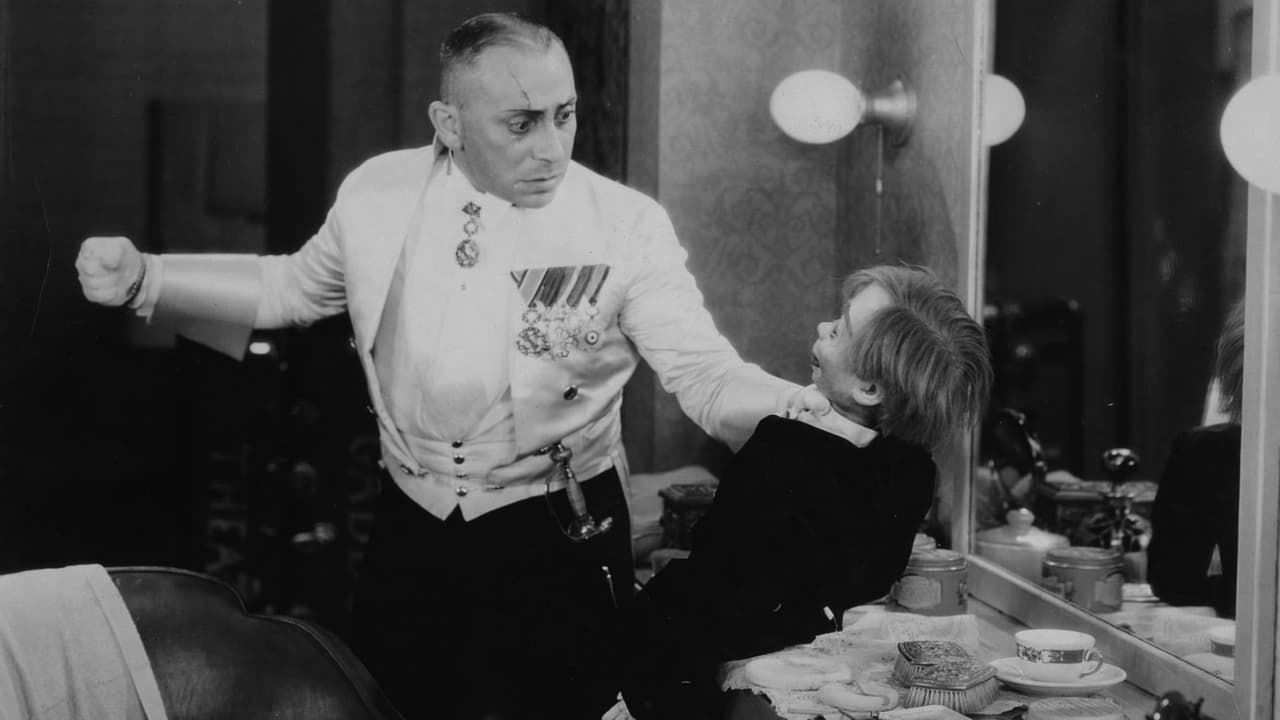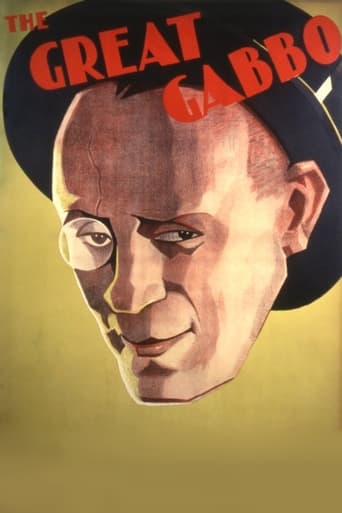

As director and actor Erich Von Stroheim did some very weird films and The Great Gabbo is certainly one of them. In this Von Stroheim is a star attraction in a Ziegfeld Follies type stage review and he is fixated on Betty Compson who used to be his assistant in his act, but walked out on him because he treated her shabbily.Now she is keeping company with Donald Douglas a young hoofer in the show. He's actually upset as well with her interest in Von Stroheim.In a way it's hard to review this because just the name of Erich Von Stroheim brings up images of barbaric cruelty show on the screen. The name alone is sufficient to conjure up horrible images.So Von Stroheim wants to set up house with her and his dummy Otto. As in most ventriloquist stories the dummy functions as an alter ego.All this with the backdrop of a Ziegfeld type show. That was interesting and like Glorifying The American Girl, The Great Gabbo is a nice filmed record of what these shows were like on stage. Although Von Stroheim is always interesting, The Great Gabbo's best value is as a record of the type musical revue so popular back then.
... View MoreO.K., so Erich Con Stroheim ain't Garbo, but as Gabbo, he has the personality of somebody who belongs in solitary confinement. He is emotionally and verbally cruel to his beautiful girlfriend Betty Compson, and when she threatens to leave him, he simply acts like he doesn't give a damn. The very autocratic von Stroheim makes Otto Preminger look like a pussy cat, and while many of his later roles lacked in humor while playing very severe brooding older men, here he is actually quite funny. I don't think that there is anything funny about mental abuse, but the way von Stroheim plays the part, his character is so phony that he makes his dummy look real. Yes, von Stroheim plays a ventriloquist, although not a very good one. Even though his character is a headliner in vaudeville shows and eventually makes it to Broadway, it is obvious that he is not actually speaking when the dummy speaks. It is obvious through his singing that somebody else is doing that, and that makes this unintentionally funny.Even funnier are the ancient musical numbers, some so funny and bizarrely staged that they have to be seen to be believed. "Every Now and Then" is actually one of the best numbers of the early sound era, with the chorus girls and boys wearing white in the front and black in the back, and when they turned it gives a very interesting effect. Another musical oddity is a musical number utilizing a giant spider web, resembling some of the most over-the-top musical numbers of this time, including the "Turn on the Heat" production number from 'Sunny Side Up", the giant idol dance from "Just Imagine" and Winnie Lightner's camp classic "Singing in the Bathtub" from "Show of Shows". Fortunately von Stroheim doesn't get involved in the dancing, only singing or pretending to, when his dummy is singing. Betty Compson is a very attractive and personable young lady, and when they are reunited when he headlines a Broadway revue where she is now part of a singing and dancing team, it brings on a break down for him that has to be seen to be believed.Yes, Max from "Sunset Boulevard" is acting most melodramatic in an early musical that actually looks pretty expensive considering that it came from one of the Z grade studios of the era, Sono Art World Wide. A montage towards the end is an interesting blend of special effects and flashbacks, and von Stroheim shows off his overacting abilities in his attempt to show this characters possible destruction. So as a curiosity, this is very much worth seeing, & I have seen it several times. Actually each time I see it, it sorta grows on me even more, and I have to call this one of the big surprises of the early sound era. Some of the chorus numbers have so many singers and dancers in them there seems barely any room to move on stage, but these early movie musicals we're certainly not at all realistic in a Broadway sensibility.
... View MoreGreat Gabbo, The (1929) ** (out of 4)Early talkie has Erich von Stroheim playing Gabbo, a ventriloquist who breaks free from his assistant and then finds huge success on his own with his dummy Otto. After his success he runs into his assistant again who by this time is also famous and Gabbo thinks he can control her like he did when they first started. This here is a pretty confusing movie because it's not quite sure what it wants to do. The stuff with the dummy controlling Gabbo might make you expect a horror movie but these elements are very few. We have the personal drama of the assistant and her new husband. We have some plot about Gabbo being crazy. Then, for some unknown reason, the final thirty-minutes pretty much gets away from the Gabbo story and we get some incredibly long music numbers but more on them in a bit. There's not too much plot here but what little there is seems to come and go as the movie goes along as we switch gears so many times that it's pretty hard to follow what the filmmakers are trying to do. The best thing about the movie and the only real reason to watch it is for the performance of von Stroheim who is perfectly wicked in the role. He gives an incredibly strong performance here and you can't help but feel the hatred of his character as it seems to be really coming out of the actor. I'm sure this period in his life wasn't the greatest so this role gave him a chance to really let out some steam. Betty Compson, who appeared in THE DOCKS OF NEW YORK, is pretty good in her role as well but the screenplay gives her a lot less to do and doesn't have nearly as flashy of a role. I'm really not sure where the music numbers come from but I'm going to guess they were added after talkies became popular and Musicals started bringing people in. The film is pretty much doing its own thing when out of no where these dance sequences come up and they'll all incredibly bad, poorly staged and most of the time the voices are so high-pitched that you'll be wishing you were watching a silent. There's one incredibly strange one where the dancers are flies stuck in a spider web that's so bizarre it's pretty much a must-see. The sound quality here is certainly among the best I've heard from this era and considering how small the budget was I'm curious how they managed to do this.
... View MoreErich von Stroheim plays Gabbo the ventriloquist, who tyrannizes his beautiful assistant Marie (Betty Compson) until she leaves him. Of course she becomes something of a star, but Gabbo succeeds even more, and is the headliner of a musical review in which she and her Stick Figure fellow (Donald Douglas) sing. There are long stage routines with fairly lousy music but exceedingly good dancing, wonderfully costumed and synchronizedthere's one effect when the female and then the male dancers are at first invisible on stage because they are wearing black capes and when they whirl around the white costumes show and then blink out again. One singer/dancer, Babe (Marjorie Kane) is also very fetching, with her Betty-Boop voice and her funny face and her athletic dancing. Compson is appealing, especially when she's talking to Otto, Gabbo's dummy and companion. Von Stroheim is steely and convincing as an egotistical bully whose sweet side is only allowed to surface in what Otto says. When Gabbo is reunited with Marie, he expects her to return, and she shows signs of being fond of him, and of Otto, but she's already married to Stick Figure, and Gabbo, whose sanity has already been suspect because he talks all the time with Otto, really goes mad. We get the whole works, temper tantrums, hallucinations via montage, interruption of the finale, and in the end a defeated Gabbo, fired from the review, walks into the night, shoulders sagging, as the crew removes his name from the marquee. It's better than this synopsis makes it sound.
... View More